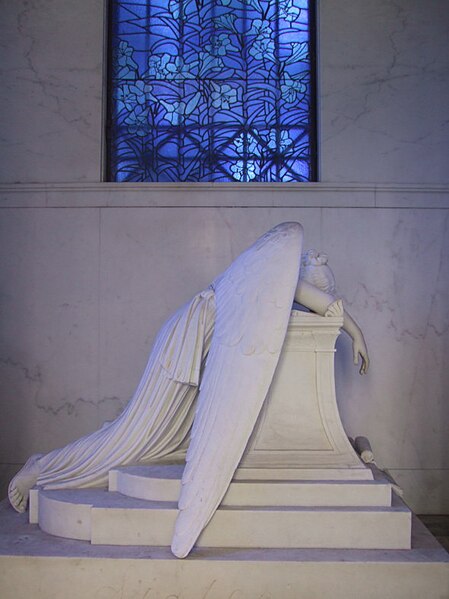 |
| Weeping Angel Metairie Cemetery, Louisiana Marcus Mosely |
What do we do with the feelings of loss, the spaces no longer occupied, the voices no longer heard?
What do we do as we encounter the remnants of our loved-now-gone one--the pictures, the phone messages, the clothes, the jewelry, the chair, the everything...
How do we establish new habits?
How do we approach a new normal?
Several fathers and mothers of folks I know have died recently.
My own father died in the first month of this year.
And... there is another funeral... for another father... tomorrow.
The processing is ... a process.
As my father remained in the hospital, I wrote.
I wrote poems to stave off the inevitable. I wrote poems to avoid certain conversations.
I wrote poems that argued with God.
I wrote poems in which God argued with me.
Poems saved me.
Poems save me.
Always poems.
It is comforting-- a source of strength--to read poems by others in similar situations, poems written in our common context of death, grief, and mourning.
It is renewing to walk or wallow in the words of those who know your story because they know their own.
Reading these poems is nodding my head--Yes! this one knows what it is like.
It is discovering a name for that which I had been struggling to name.
A validation of my emotions in stanzas.
A credentialing of my experience in verses.
Kevin Young offers two wonderful sources of such poetry.
 In The Art of Losing: Poems of Grief and Healing,
In The Art of Losing: Poems of Grief and Healing,Young categorizes the poems in five sections mirroring the stages of grief, outlining universal responses, enumerating the process--Reckoning, Remembrance, Rituals, Recovery and Redemption.
This is a compilation of work by our best loved poets.
Your favorite poets are included. Mine are, too.
We are offered, in this collection, a gift that can cover our wounds and heal our open places.
In this anthology he gives us a way through... a way back to ourselves.
In his introduction he explains:
The best poems, it seems to me, evince their origins in the need to speak, or to write; to render a complex fate simply; to render chaos as chaos; or to examine the unseen complexities of seemingly simple, even everyday experience. A poem must be willing to be unwilled, beckoned by need...
I am struck here that in our time of need, or high celebration, we reach for poetry just as we do food....Poetry steps in at those moments when ordinary words fail: poetry as ceremony, as closure to what cannot be closed.
Kevin Young knows first hand the pain of losing a loved one. His father died a sudden and tragic death.
 In Book of Hours: Poems
In Book of Hours: PoemsHe reaches back-- a decade after his father's death --to remember, to analyze, to rant, to question. He interweaves his pondering with birth-- and many small dyings and risings.
He starts in Bereavement near the beginning of his collection:
Behind his house, my father’s dogs
sleep in kennels, beautiful,
he built just for them.
They do not bark.
Do they know he is dead?
They wag their tails
& head. They beg
& are fed.
Their grief is colossal
& forgetful.
Each day they wake
seeking his voice,
their names...
Click here to read the entire poem, Bereavement.
His words take us through a lifetime of living and mourning and living again to, in his last words in the book., an invitation to sing.
...Welcome
the moon's squinting
into space.
The trees
bow like priests.
The storm lifts
up the leaves.
Why not sing.
Poems heal us.
Poems save us.
Which poems have you read in the midst of mourning?
What other writings have your read in your grief?
What poems did you write to save yourself?
Click here read my related previous post, Lifetimes, Deaths, and Beyond, which suggests additional resources related to death for children, as well as adults.
Today's Deeper Writing Possibilities
Remember and reflect on a loss in your life. It may be a death-- or it may be the loss of job, relationship or something else important to you.
What did you read to help you through your loss?
What did you write to help you process your loss?
Write a poem of remembrance. Celebrate the absent. Explore your journey back to yourself.
No comments:
Post a Comment